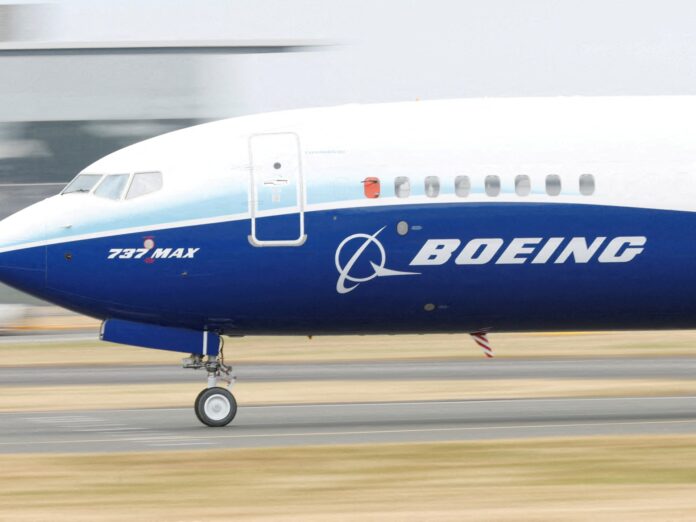A United States federal judge has turned down a proposed deal in which Boeing would have admitted guilt to a felony conspiracy charge and paid a fine for deceiving US regulators about the 737 Max jetliner before two fatal crashes occurred, resulting in the loss of 346 lives.
US District Judge Reed O’Connor in Texas on Thursday highlighted concerns about diversity, inclusion, and equity (DEI) policies within the government and at Boeing, suggesting that race may influence the selection of an individual to monitor Boeing’s compliance under the agreement.
This ruling creates uncertainty around the criminal prosecution of the aerospace giant related to the development of its popular aircraft.
The judge has given Boeing and the Justice Department 30 days to outline their next steps, which could involve renegotiating a new plea agreement or proceeding to trial.
The Department of Justice is currently reviewing the ruling, while Boeing has yet to comment.
Paul Cassell, a lawyer for families of crash victims, hailed the decision as a significant win for the rights of crime victims.
Regarding the rejected deal reached in July, it would have allowed Boeing to plead guilty to defrauding regulators involved in approving pilot-training requirements for the 737 Max nearly ten years ago. Prosecutors did not find evidence linking Boeing’s deception to the crashes.
The role of DEI
In his verdict, O’Connor honed in on an aspect of the agreement that stipulated the selection of an independent monitor to oversee Boeing’s efforts to prevent violations of anti-fraud laws during a three-year probation period.
O’Connor particularly raised concerns about the requirement for considering race in the hiring of the independent monitor, as part of the Justice Department’s commitment to diversity and inclusion.
The judge expressed doubts about whether the monitor selection process would be free from race-based considerations, emphasizing the importance of impartiality in such a crucial case.
O’Connor further objected to the plea agreement giving the government the authority to select the monitor and for the appointee to report to the Justice Department instead of the court. He also noted that Boeing would have the power to veto one out of six candidates chosen by the government.
Experts like Todd Haugh from Indiana University noted that rejecting plea agreements over DEI concerns is rare, emphasizing how this move compromises the sentencing power of the court. The issues raised by the judge in this case were notably centered around DEI, showcasing a clear stance on the matter.
The ruling has left prosecutors in a dilemma, as they must navigate the complexities of adhering to government DEI policies from 2018 while weighing the uncertainties of pursuing a trial.
Boeing only entered into the plea deal after the Justice Department determined the company’s violation of a 2021 agreement, which shielded it from criminal prosecution on the same fraud-conspiracy charge.
Boeing stated that if the plea deal were rejected, they would contest the finding of the violation of the earlier agreement, which would weaken the government’s case.
The ruling on Thursday favored Boeing’s position, as it cast doubt on the specifics of the violation that led to the 2021 agreement.
The Justice Department accused Boeing of defrauding Federal Aviation Administration (FAA) regulators involved in approving pilot-training requirements for the 737 Max.
Acting on incomplete disclosures from Boeing, the FAA endorsed minimal, computer-based training instead of more rigorous flight simulator training. The decision to opt for simulator training would have raised operating costs for airlines using the Max, potentially pushing them to purchase planes from competitor Airbus instead.
Outraged families
Following the Justice Department’s announcement in 2021 that it had settled and wouldn’t prosecute Boeing for fraud, families of the victims expressed outrage. Judge O’Connor previously ruled that the Justice Department violated a victims-rights law by not informing relatives about negotiations with Boeing, but noted his inability to overturn the deal.
The 2021 deferred-prosecution agreement was set to expire in January, with expectations that prosecutors would seek to permanently dismiss the case. However, just days before that, an incident occurred on an Alaska Airlines flight involving a 737 Max, reigniting concerns about Boeing’s manufacturing quality and safety.
This case adds to the mounting challenges facing Boeing, which has faced significant financial losses since 2019 and has fallen behind Airbus in sales and deliveries of new aircraft.
Boeing has encountered other setbacks, including a strike by factory workers earlier this year, resulting in the shutdown of most plane production for seven weeks, and the announcement of layoffs affecting 10% of its workforce, approximately 17,000 employees. The company’s stock has also plummeted by about 40% in less than a year.




